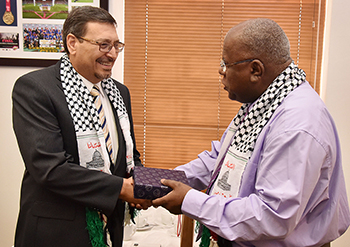Latest News Archive
Please select Category, Year, and then Month to display items
25 March 2024
|
Story Anthony Mthembu
|
Photo Lutendo Mabata
 Prof Nompumelelo Zondi, the newly appointed Vice-Dean: Research and Postgraduate Studies in the Faculty of The Humanities at the University of the Free State (UFS).
Prof Nompumelelo Zondi, the newly appointed Vice-Dean: Research and Postgraduate Studies in the Faculty of The Humanities at the University of the Free State (UFS).
Prof Nompumelelo Zondi has been appointed as Vice-Dean: Research and Postgraduate Studies in the Faculty of The Humanities at the University of the Free State (UFS). Prof Zondi assumed this new role on 1 March 2024 after serving as the Head of Department for African Languages at the University of Pretoria for seven years. “I consider this appointment as an opportunity of growth and learning more about higher education and the Faculty of The Humanities at large,” she said.
Prof Zondi indicates that part of her role is to spearhead the UFS Vision130 within the Faculty of The Humanities, and to ensure that the faculty assists the institution in becoming research-led, student-centred, and globally impactful.
Motivation for assuming this role
One of the primary reasons that led her to consider this role is sharing the knowledge she acquired as part of the Fulbright South African Research Scholar Programme. As a result of that experience and exposure, which went beyond the Ohio State University, she felt it befitting to implement some of the insights she acquired on a bigger scale. Therefore, even though she was impactful in her previous role, Prof Zondi believes that this is an exceptional and more desirable platform to do so. “I feel that I will have easier access to departments within the faculty, while also encouraging and supporting interdepartmental and faculty collaborations,” she explained.
A significant component of Vision 130
He believes that the elements that make up Vision 130 are interrelated. While she considers research central to Vision 130 – as she begins her journey at the UFS, she feels students deserve to be nurtured to further contribute to the university’s impactful research. Thus, student-centredness is the way to go. “I believe that students must be major role players in this Vision130; we must include them in the interactions and discussions that are part of the university’s strategic plan as well as in decision-making processes,” she said. As such, according to Prof Zondi, the more the faculty and the institution care for the students and involve them in Vision130 and in collaborations, the more research outputs the university will achieve.
Palestinian delegation visit marks new bilateral relations
2015-11-27

Prof Jonathan Jansen and His Excellency Mr Hashem Dajani
Photo: Charl Devenish
|
The Office of International Affairs hosted the official visit of the Ambassador of Palestine, His Excellency Mr Hashem Dajani, to the University of the Free State (UFS) on 16-17 November 2015. Prof Jonathan Jansen, Vice-Chancellor and Rector of the UFS, welcomed the Ambassador and the Palestinian delegation to the Bloemfontein Campus. During the visit, they met with senior management of the university, including Dr Karen Lazenby (Registrar: Systems and Administration), Beata Mtyingizana (Director of International Affairs) and JC Van der Merwe (Deputy Director at the Institute of Reconciliation and Social Justice).
The visit marked the finalisation of a scholarship initiative which offers placement of Palestinian students to study at the UFS. The new Vice-Chancellor’s International Scholarship programme will recognise academic excellence and merit in undergraduate, postgraduate, as well as doctoral academic disciplines.
One of the strategic objectives of the UFS is that of internationalisation, which is strengthened by the scholarship programme. With the focus on Palestine, the university’s international footprint in non-traditional regions of the world, such as the Middle East, will therefore be highlighted.
To conclude the visit, the Institute for Reconciliation and Social Justice hosted a film screening featuring ‘Jerusalem, the east side story’. The documentary mainly looks at the past forty years of Israeli military occupation policies in Jerusalem and the subsequent impact on the city and its people.
“Peace in Palestine is key to world peace,” Ambassador Dajani said. “The issue of self-determination is central to the Palestinian effort, and, through the assistance of the international community, it can it be realised.”